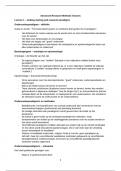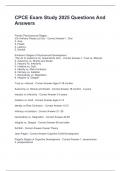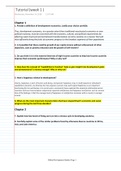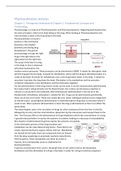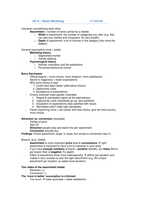MACBETH STUDY NOTES
Main Characters-
Characters Analysis
Macbeth Scottish General and Thane of
Glamis
Begins and ends on the battlefield
First represented as brave warrier –
then audience learns he has fear,
self-doubt, unhealthy ambition – lacks
skills to rule without being a tyrant
Response to every problem is murder
Lady Macbeth One of Shakespeare’s most famous
and frightening female characters
Uses female methods of manipulation
to get power – questions Macbeth’s
manhood
Has the most ambition but also the
most guilt – not completely
represented as antagonist because
audience feels for her
The Witches Referred to as ‘weird sisters’ by many
Lure dark thoughts and unconscious
temptations
Represented as ridiculous supernatural
creatures – could be seen as the voice of
temptation and not real characters
Speaking rhymes dehumanizes them and
separates them from other characters
Banquo Duncan acknowledges him as ‘no less
deserved’ of praise than Macbeth. But he
is overshadowed by Macbeth’s
accomplishments
Has ambition but doesn’t let it get in the
way of consciousness
More pragmatic and level-headed than
Macbeth; “Oftentimes, to win us to our
harm, / The instruments of darkness tell
us truths, / Win us with honest trifles, to
betray ‘s / In deepest consequence.”
Macbeth killing Banquo is what triggers
his madness
In some ways a foil to Macbeth, as well as
a threat to him
Banquo’s ghost is a highly important
‘character’ – consider how this would
appear on stage… (do the audience see
the ghost?)
Supposedly an ancestor of King James I
Not perfect: foolishly never shares his
suspicions with others
King Duncan Humble, non-corrupt, virtuous, benevolent
leader of Scotland
Death symbolises the destruction of order
Epitome of the perfect ruler, though he is
somewhat naïve (both of his Thanes of
Cawdor are traitors)
Represents stability and social order
, MACBETH STUDY NOTES
Likeable, but not fearsome ruler
Macduff to Malcolm: “fit to govern, no…
thy royal father was a most sainted king”
His death contravenes the divine right of
kings
Ominous weather events after his death =
unnatural sin
Has two sons (Malcolm and Donaldbain)
in contrast to Macbeth’s zero
“who would have thought the old man to
have had so much blood in him?”
Malcolm Duncan’s first son
Restores natural order in Scotland
First appears weak and uncertain of his
own power but then becomes serious
challenge to Macbeth
Initially timid, inexperienced, and ill-
equipped to navigate the complex and
violent political sphere
Gradually becomes a more adept political
figure (with the guidance of Macduff)
Lots of hints that he is intelligent and
dextrous
Act 4 Scene 3 = his time to shine; he is
promisingly shrewd: “first false speaking
was this upon me”
Macduff Macbeth’s enemy
Stands out from many secondary
characters because of harm Macbeth
does to him
Hard to justify why he leaves family – but
feels bad and gets revenge for them
Extreme loyalty to country – kills
dishonorable, destructive king
A foil to Macbeth, but also in many ways
imperfect (like Duncan)
Chivalrous in his treatment of women
(“’Tis not for you to hear what I can speak.
/ The repetition, in a woman’s ear, / would
murder as it fell”)
Genuinely grieves Duncan’s death (unlike
the Macbeths)
Prioritises the welfare of the country over
himself (and his family… does this make
him less sympathetic?)
Ends the play seemingly with nothing; is
he rewarded?
Minor Characters:
Characters Analysis
Lady Macduff Enforces traditional gender roles
Comes to believe Macduff is a traitor after
he leaves his family to flee to England
without telling them
Loyal – however, makes no attempt to
save her own life at her husband’s
expense
Lennox Young thane attending to Duncan
Not the brightest – used as mouthpiece
for duces
Main Characters-
Characters Analysis
Macbeth Scottish General and Thane of
Glamis
Begins and ends on the battlefield
First represented as brave warrier –
then audience learns he has fear,
self-doubt, unhealthy ambition – lacks
skills to rule without being a tyrant
Response to every problem is murder
Lady Macbeth One of Shakespeare’s most famous
and frightening female characters
Uses female methods of manipulation
to get power – questions Macbeth’s
manhood
Has the most ambition but also the
most guilt – not completely
represented as antagonist because
audience feels for her
The Witches Referred to as ‘weird sisters’ by many
Lure dark thoughts and unconscious
temptations
Represented as ridiculous supernatural
creatures – could be seen as the voice of
temptation and not real characters
Speaking rhymes dehumanizes them and
separates them from other characters
Banquo Duncan acknowledges him as ‘no less
deserved’ of praise than Macbeth. But he
is overshadowed by Macbeth’s
accomplishments
Has ambition but doesn’t let it get in the
way of consciousness
More pragmatic and level-headed than
Macbeth; “Oftentimes, to win us to our
harm, / The instruments of darkness tell
us truths, / Win us with honest trifles, to
betray ‘s / In deepest consequence.”
Macbeth killing Banquo is what triggers
his madness
In some ways a foil to Macbeth, as well as
a threat to him
Banquo’s ghost is a highly important
‘character’ – consider how this would
appear on stage… (do the audience see
the ghost?)
Supposedly an ancestor of King James I
Not perfect: foolishly never shares his
suspicions with others
King Duncan Humble, non-corrupt, virtuous, benevolent
leader of Scotland
Death symbolises the destruction of order
Epitome of the perfect ruler, though he is
somewhat naïve (both of his Thanes of
Cawdor are traitors)
Represents stability and social order
, MACBETH STUDY NOTES
Likeable, but not fearsome ruler
Macduff to Malcolm: “fit to govern, no…
thy royal father was a most sainted king”
His death contravenes the divine right of
kings
Ominous weather events after his death =
unnatural sin
Has two sons (Malcolm and Donaldbain)
in contrast to Macbeth’s zero
“who would have thought the old man to
have had so much blood in him?”
Malcolm Duncan’s first son
Restores natural order in Scotland
First appears weak and uncertain of his
own power but then becomes serious
challenge to Macbeth
Initially timid, inexperienced, and ill-
equipped to navigate the complex and
violent political sphere
Gradually becomes a more adept political
figure (with the guidance of Macduff)
Lots of hints that he is intelligent and
dextrous
Act 4 Scene 3 = his time to shine; he is
promisingly shrewd: “first false speaking
was this upon me”
Macduff Macbeth’s enemy
Stands out from many secondary
characters because of harm Macbeth
does to him
Hard to justify why he leaves family – but
feels bad and gets revenge for them
Extreme loyalty to country – kills
dishonorable, destructive king
A foil to Macbeth, but also in many ways
imperfect (like Duncan)
Chivalrous in his treatment of women
(“’Tis not for you to hear what I can speak.
/ The repetition, in a woman’s ear, / would
murder as it fell”)
Genuinely grieves Duncan’s death (unlike
the Macbeths)
Prioritises the welfare of the country over
himself (and his family… does this make
him less sympathetic?)
Ends the play seemingly with nothing; is
he rewarded?
Minor Characters:
Characters Analysis
Lady Macduff Enforces traditional gender roles
Comes to believe Macduff is a traitor after
he leaves his family to flee to England
without telling them
Loyal – however, makes no attempt to
save her own life at her husband’s
expense
Lennox Young thane attending to Duncan
Not the brightest – used as mouthpiece
for duces

